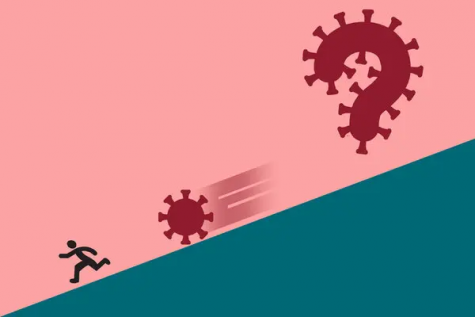The Psychology and Rationality Behind Panic Buying
May 18, 2020
With the world on lockdown due to the coronavirus pandemic, people are forced into situations they have never prepared to be experienced for. One of those experiences is panic buying. This has led to a shortage of certain necessities such as toilet paper, hand sanitizer, water, etc. Due to the fear of running out of supplies in a time of a worldwide lockdown, people resort to hoarding bulks of the same item that they believe is necessary. But what is it that makes people drive themselves into a crazed shopping frenzy?
Decision making occurs in the human brain either rationally or emotionally. Though one may try, it is nearly impossible to solely rely on rational thinking and detach one’s emotional responses. This decision-making is seen in disaster planning, seen in the hoarding of various products today. Though one’s rational brain may convince otherwise, the emotional brain may nudge one to be safe rather than sorry. The emotional mind is highly attuned to visual imagery, and with social media exposure of the virus and news media portraying people wearing masks, people may be more inclined to hoard.

Fear is contagious; this means that if one observes the majority of the population feeling fearful for a certain situation, others observe the behavior and normalize it, acting the same and copying others’ actions. When people see masses irrationally buying an excess of supplies, they rationalize such conduct and imitate it, believing that hoarding is logical. Such behavior is also known as herd mentality. Additionally, anticipatory anxiety, fear, and dread experienced before an event is another great factor that induces panic-buying. Often, people who have anticipatory anxiety overly worry about prospective events, impelling them to prepare for the worst. Lastly, people respond to uncertainty differently. Those who have an intolerance of certainty frequently feel that they have lost control of their situation, leading them to overcompensate. With these feelings of helplessness, during the pandemic, many individuals have felt the need to stock amass products to gain a sense of command.

Though hoarding these supplies might seem irrational, it actually has a rational basis. Hoarding is the natural result stemming from the belief that a product is scarce–whether or not this belief is true. Additionally, low tolerance to uncertainty is associated with extreme hoarding behavior. This low tolerance causes the same psychological mechanisms that cause people to buy products they might not even need. Even though hoarding may have a rational basis in the human brain, this does not mean that hoarding is rational. It’s important to consider the needs of others, especially the needy, instead of stacking up excessively with products you might not use in the near future.

Through these hard times, irrational actions are common and caused by a psychological fear of running out of supplies for survival. Unfortunately, many people cannot afford or have access to said supplies, so we must take it upon ourselves to remember the people who struggle in such tragic times. When buying necessities, take other people into consideration and ask yourself if you have more than enough.


